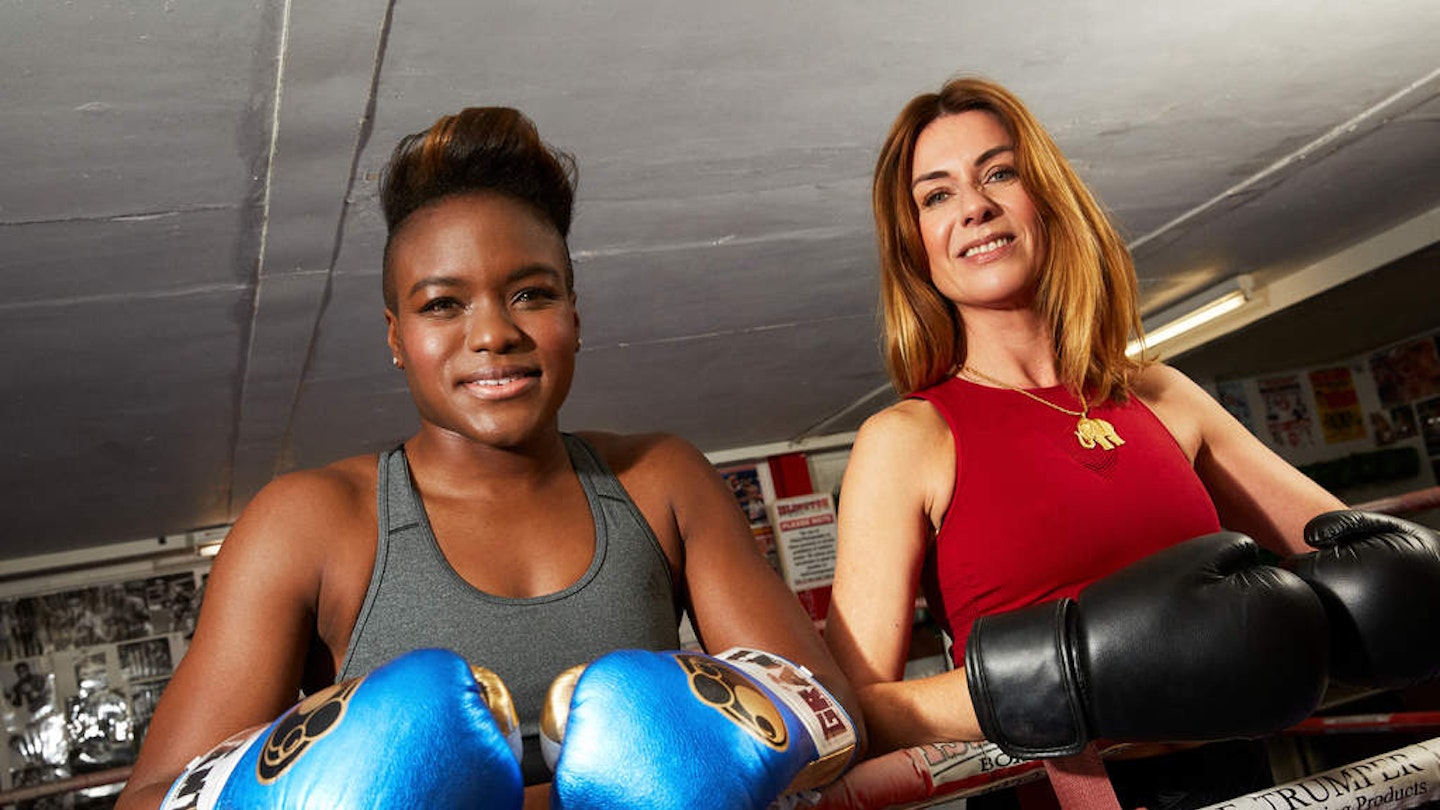I meet Nicola Adams, OBE, MBE, Two-Time Olympic Gold Medal Winner - at Islington Boxing Club in North London, the two-storey, leaky-roofed sweatbox of a community gym where local champions train alongside Hollywood superstars, and - on Saturday mornings, between 10 and 11, at the women's only recreational club that I've come to love beyond all else - me.
Adams bowls in, fresh out of a cab from Leeds, like this gym is her second home. She hasn’t been here before, but she knows these places so well. A community boxing gym just like this one – raw, authentic, cool – was where she first put on a pair of gloves, swung her first punch, and sealed her fate as one of the greatest British athletes of our time.
‘I was 12. I was the only girl and it was actually by accident,’ she tells me once the Grazia shoot has finished (a process she nails. Adams is beautiful but, more importantly, knows her angles. She’s 36 years old and already an old pro) We’re sitting by the side of the boxing ring; she’s eating the healthiest thing on the Nando’s menu (grilled chicken wrap), transported by Deliveroo. ‘My mum used to do aerobics, and she couldn’t get a babysitter, and they had a boxing class at the same place, so one night, she took me and my brother down.’
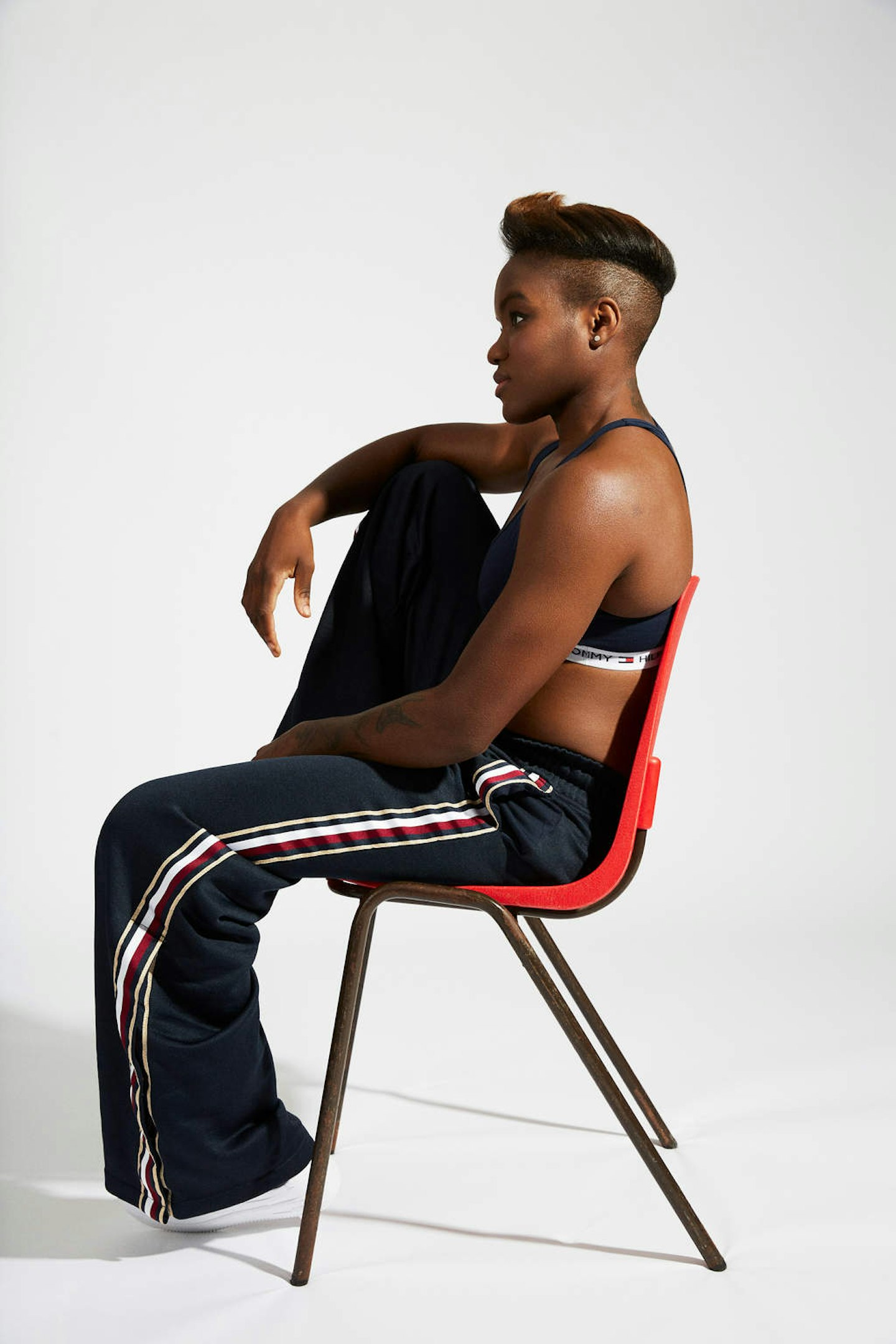
Childcare set you on a path to the Olympics? ‘Literally.' What was it about boxing? ‘I just loved it. The atmosphere; seeing everybody working out, training, having fun, all the kids running around, playing games. I’d seen re-runs of Muhammad Ali and Mike Tyson fighting, and I was like: Oh man. is is so cool!' How did it feel, the first time you threw a punch? ‘Unreal. Unreal!’ And the first time you realised you were good?** ‘I was 13, and my coach, after a year of training, he said: “You look pretty good, I think you’re quite talented. Have you ever thought about getting into competition?” Oh! I was buzzing!’
That was 23 years ago. Nicola Adams has spent two and a half decades boxing her way up the ranks, starting at a time before women’s boxing was even legal (the British Boxing Board of Control denied women a licence to fight until 1998 – when Adams was 17 – on the grounds that PMT makes us unstable). She won Gold at the London Olympics in 2012, only three years after women’s boxing was recognised as an Olympic sport at all.
It was in 2012 that the nation fell in love with Adams, this small, insanely powerful Yorkshire woman, whose expression is one of barely suppressed fury when she’s in the ring, but whose room-mesmerising smile breaks through like a goddamn miracle the moment she’s won, which she usually does. I remember watching her in 2012 – as a woman who’d never given a damn about boxing until that point – and thinking: bloody hell. She’s so cool!
Six months after Adams won her second Gold, in Rio in 2016, I walked through the doors of Islington Boxing Club for my first class. It would prove one of the best choices I’ve ever made. There is no question that Nicola Adams made me to do it. It’s a hideous old cliché, but Adams is a trailblazer. She is Northern: Leeds born and raised. Working class and black; a small, sickly kid: ‘The doctor said my asthma was that bad I shouldn’t even play in the playground. I was like: I’m not doing that.’ A girl who boxed long before grown women were supposed to. A girl who felt powerless watching her father hit her mother Dee, when Adams was terribly young.
She’s openly bisexual – she came out to her mum Dee when she was just 14; Dee responded: ‘That’s fine, love.’ So Nicola Adams represents triumph over hardship, strength through adversity, and the beautiful possibilities of inclusiveness. Because of this, she resonates with everyone. Me. Frank Warren – the boxing promoter who once said, ‘I don’t like women’s boxing. Never have, never will,’ but who now promotes Adams. The legions of amateur and pro female boxers coming up behind her. The newbies who signed up for boxing fitness classes in the UK last year, 50% of whom were women and girls.
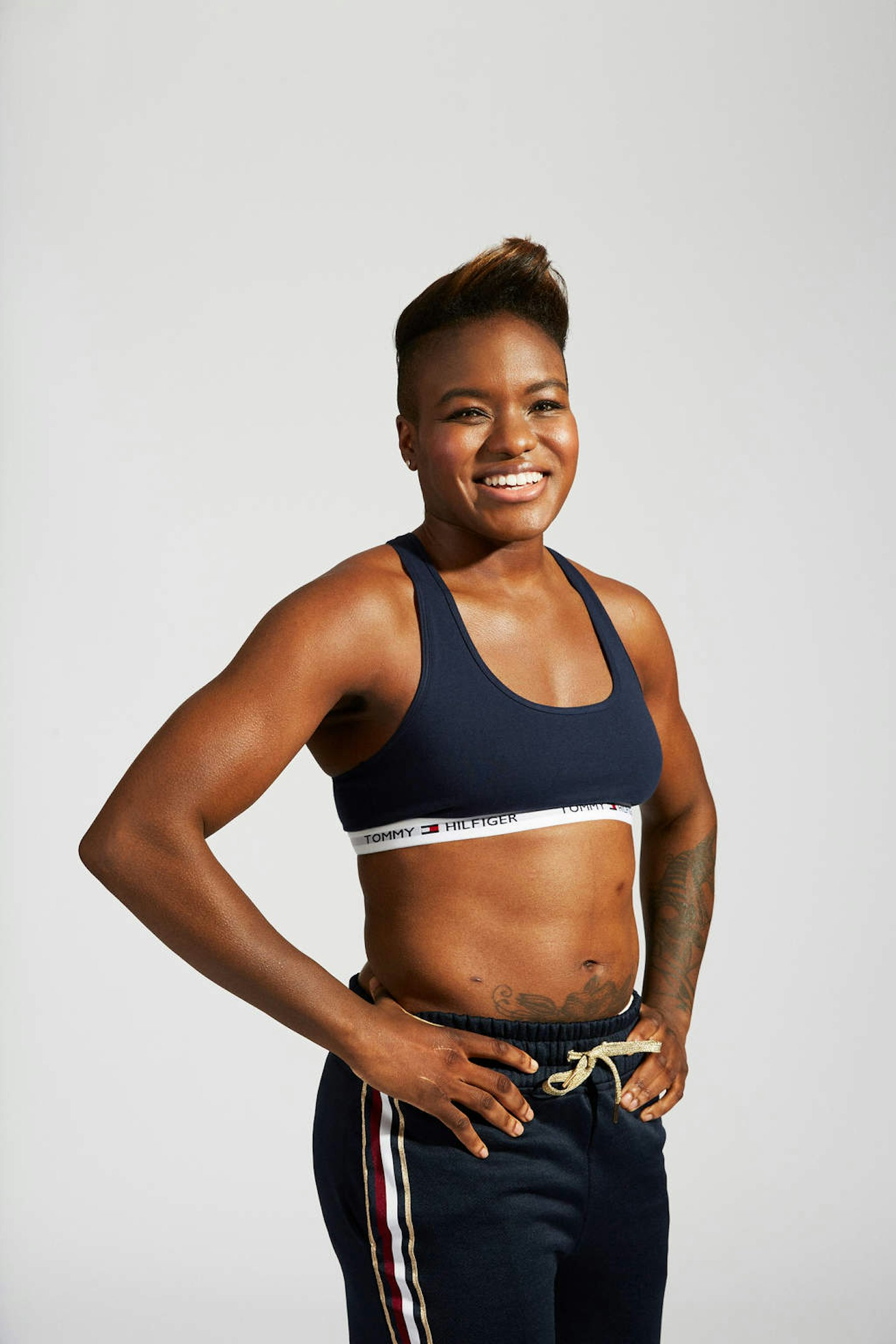
Adams wears it lightly. I ask her what it’s like to have changed the world; she’s chill, casual. ‘It’s good to see other girls in the gym, getting fit, staying in shape. It’s nice to think I’ve played a part.’ I ask her if her intentions are feminist. ‘In some respects. I feel like we should be able to do whatever job we please. And get the same pay. I mean, [my pay] is OK, because I’ve come into professional boxing as a double Olympic champion, but for the other girls, who haven’t got that profile, it’s harder to get started, get good money.’
You could call Adams an unintentional feminist icon. Her main interest is winning, as a side-consequence of which, she’s become a one-woman revolution. I think about the power she represents, both physical and cultural. I think about how empowered I feel, every time I raise a gloved fist and punch a bag; when I watch the other women in my group unleash oceans of contained, tactical, respectful violence on each other. We all box at least partly, if not completely, because of Nicola Adams’ example; because we box, we feel more powerful and empowered than we have ever felt.
I ask Adams about promoter Frank Warren’s change of heart over women’s boxing; her other, great, inadvertent feminist act ‘It was a funny one, because he approached me. I was like: “Oh. OK.” What was his opening gambit? ‘He said whenever he’d got into a taxi lately, they never mentioned any of the lads. They only mentioned me.’
As I interview Adams, I remember the thing I always remember when interviewing athletes: they’re not like us. They are, by definition, uniquely focused, less open to entertaining the haphazard mess of existence into which the rest of us throw ourselves headlong. They don’t really do vulnerability, or existential crises, or the bigger picture. They can’t.
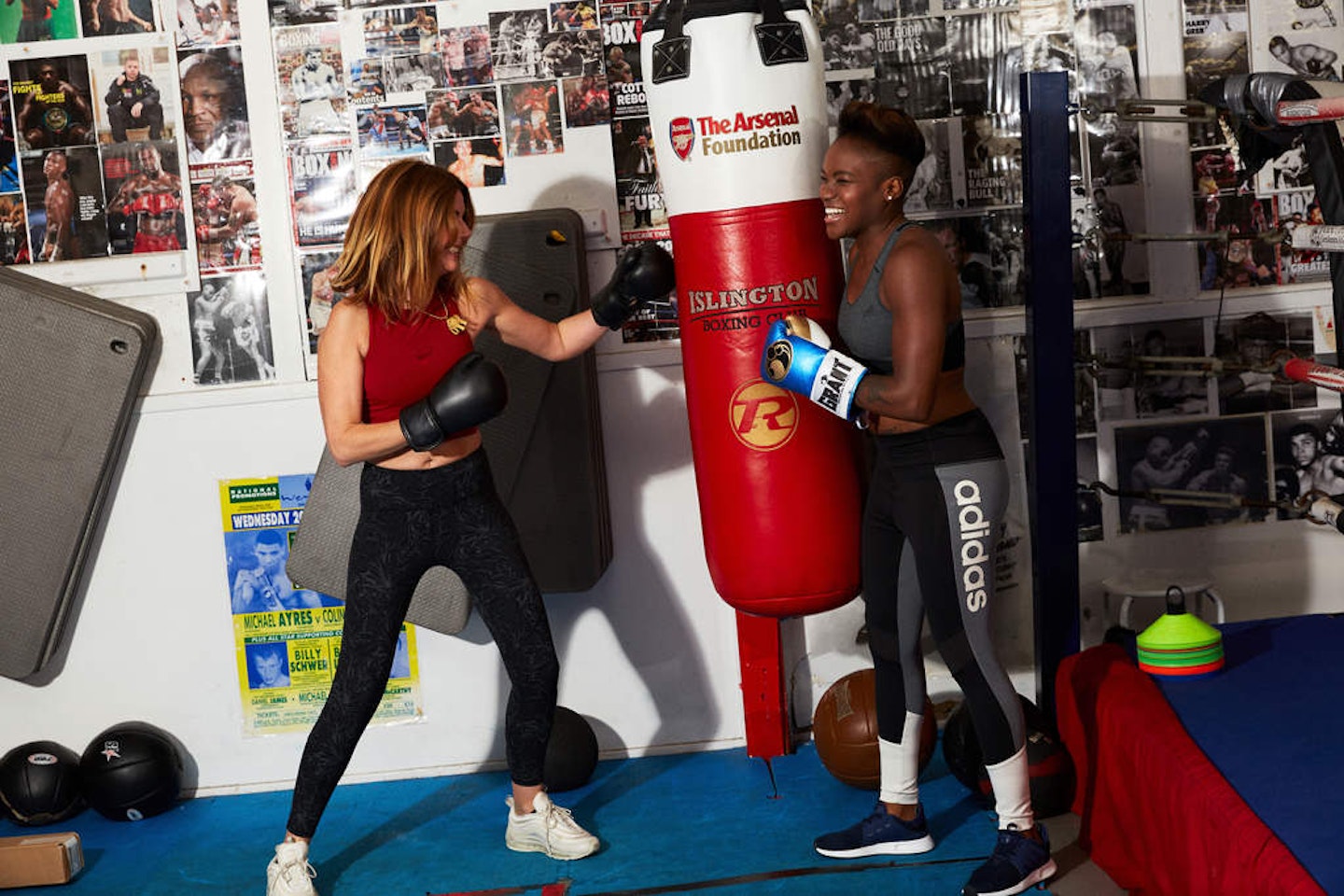
When, for example, I ask Adams if she thinks there was any connection between her seeing her father hit her mother and being unable to intervene, and her ultimately excelling in the sport of hitting (which, by the way, she took up just a er her mother finally left her father), she says only: ‘Not really, because it was only by chance I ended up in the boxing gym.’ And when I ask her when she last cried, she says: ‘I don’t cry. Well. I cried when I won my second Olympic medal. I don’t know what happened. I was like: “What is going on?” Must have been my allergies.’ So she hasn’t cried for two and half years, then; not even in April last year, when she split up with her fiancée, who she shared a home with in San Francisco (where Adams is based when she trains).
2018 was a tough year, I suggest. ‘Yeah, but...’ She tails off. You’re over it? ‘Massively. I could sit and have a pity party, but I choose not to.’ I quietly wonder what it’s like to simply choose not to cry; but I ask Adams about the last time she got into a bad mood: ‘I burnt my nachos the other day. I was fuming!’ And does she know how terrifying she looks in the ring? ‘Nah! I’m just concentrating.’ The only thing, I think, that really penetrates with Adams, is losing. ‘It’s the worst. The worst. I’m a bad loser.’ Pause. ‘I haven’t lost since 2013...’
You’re out of practice, I say. ‘Hmmmmmm...’ ...Which doesn’t matter, because you’re never going to lose again? ‘Well – yeah!’ Adams says. Her plan is to be World Champion – a title for which she’ll fight later this spring – then never lose another fight. ‘Retire, undefeated.’ I wonder if Adams’ self-belief, her emotional-Tefal disposition might be a consequence of her training six days a week. Of all the incredible things boxing brings me, the flood of unadulterated happiness that washes over me during each class is the best. I mean, realising I could actually enjoy cardio is big... and the astounding overall improvement in my (previously non-existent) fitness levels is nice too, but really: the goddamn joy, when I box.
If I trained as much as Nicola Adams, perhaps I’d feel as permanently upbeat as she seems. And as self-accepting. ‘I love my sport,’ she says, and: ‘I love my body’ like these things are one and the same. ‘I love the way I look. I go on holiday, I’ve got the beach body already. I’m prepared!’
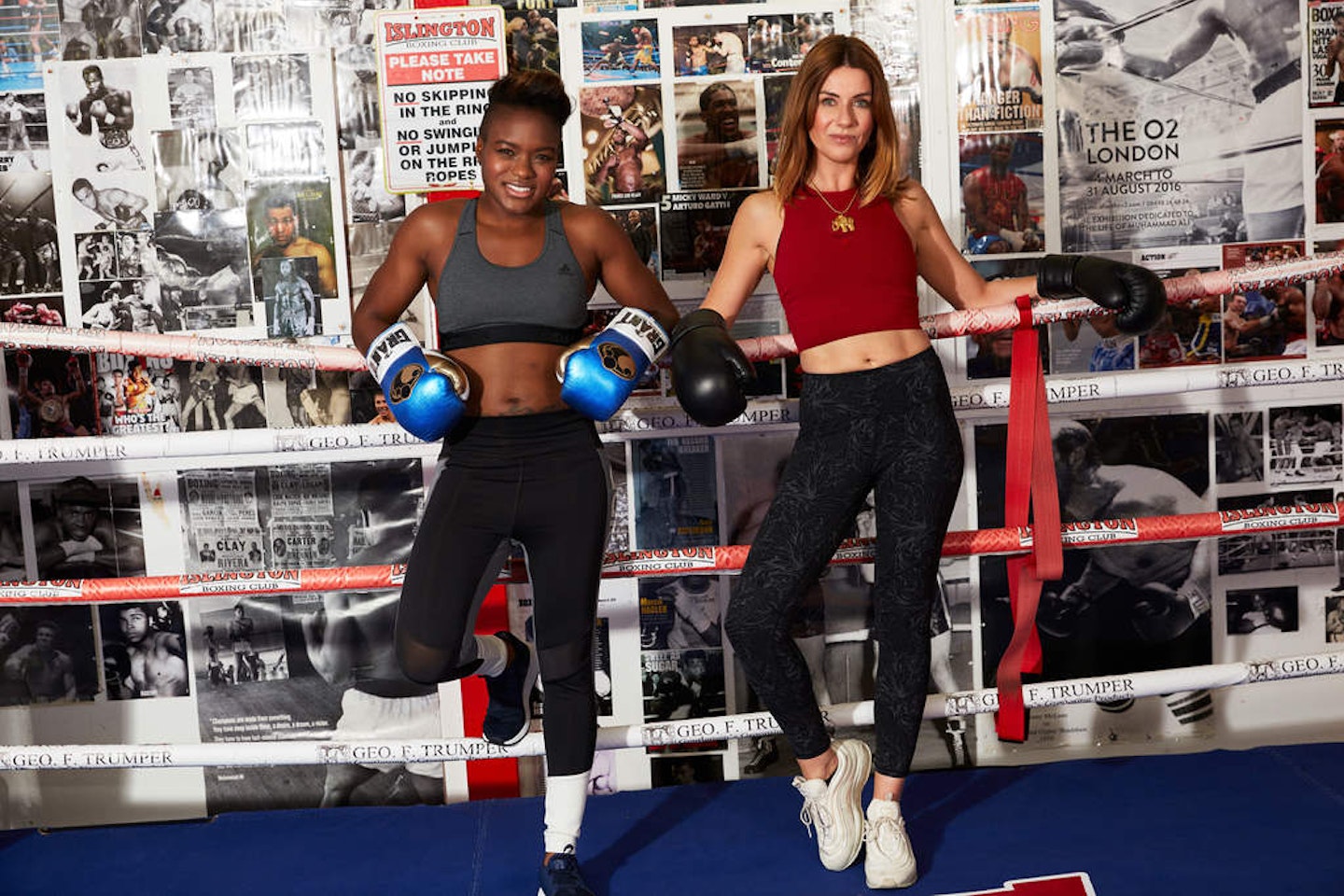
She says she’d be an actor if she weren’t a boxer; she was an extra on BBC drama Waterloo Road until she got fired ‘because I got too famous boxing to blend in’. I ask her what the Queen said to her when she got her MBE and she says: ‘“Well done.” I met the Queen for my MBE and William for the OBE.’ Who’s best? ‘Couldn’t pick. I know ’em so well, now.'
Has she turned into a diva? ‘No. No diva. Oh! Except when it comes to airports and lounges. I like a good lounge.’ We finish. Nicola Adams has to get her car back to Leeds, where she’s based when she’s not in San Francisco, and also pose with the half of the gym users who haven’t already got a selfie.
We say goodbye. I thank her like I’ve never thanked any interviewee before; partly for her time today, mostly for getting me up off my arse and into a boxing club and changing my life forever, for the better.
With thanks to Islington Boxing Club (islingtonboxingclub.org) and Sweaty Betty
